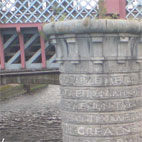Upon the Pillars of the Old Caledonian Railway Bridge over the River Clyde Inscribed,
with a Quote from Plato’s The Republic and a translation by Heidegger,
by Ian Hamilton Finlay and his Collaborators.
or
Fine Things are Hard
Waving to the ghost of Ozymandias,
the Hand of History finger-tips North,
pausing by the Bridge,
where two massive Legs of Stone are Being, washed
by the watery expanse.
Inscribed in the Stone, moss-strewn and barnacled, the Hand senses:
TA ΓAΡ ΔΗ ΜΕΓΑΛΑ ΠΑΝΤΑ ΕΠΙΣΦΑΛΗ ΚΑΐ ΤΌ ΛΕΓΌΜΕΝΌΝ ΤΑ ΚΑΛΑ ΤΏΙ ΟΝΤΙ ΧΑΛΕΠΑ
The Hand scratches its metaphorical Head.
And then, with infinite care, the Hand extends an accusative digit
at all who pass by, which seems to imply:
‘D’ye ken whit tha’s aboot?’
Chronology:
c.360 BC: Plato inscribes The Republic, Athens.
1818: Percy Bysse Shelley inscribes Ozymandias, London.
1878: William Arrol constructs Caledonian Railway Bridge over River Clyde, Dalbeattie granite. Arrol also indirectly involved in construction of Tate Modern Art Gallery and the Titanic.
1933: Heidegger uses his translation of Plato’s The Republic, 6.497d: ‘All that is great stands in the storm…’ as the final line of his inaugural address as Rector of Freiburg University, Germany. His address is followed by three salutes to the leader of the National Socialist Party.
Alternative translations include:
‘..all great things are perilous, and it is true, as the proverb says, that beautiful things are hard’ (Lindsay, 1906);
‘For all great things are precarious and, as the proverb truly says, fine things are hard’ (Shorey, 1935);
‘For surely all great things carry with them the risk of a fall, and, really, as the saying goes, fine things are hard’ (Bloom, 1968)
‘For all great things are dangerous, and, as the proverb has it, excellent things really are hard.’ (Allen, 2006)
1966-7: Railway tracks removed from Caledonian Railway Bridge.
c.1990: Ian Hamilton Finlay’s designs for the pillars inscribed. |
|
The Ballad of Anton and Lynne
Tony, alias Anton, is chewing gum.
His back to the river, he wears a gun
Strapped to his chest, near his vest.
His tracksuit’s nylon, grey and red.
His profile looks like molten lead,
Craggy and deep, a gaoler’s keep.
His hair’s slicked back with sticky gel;
His trainers, Nike, have done him well:
He’s had to run, and not for fun.
He scans the sidewalk with spot-check eyes,
The bridge, the arches, all the passers-by,
While he’s waiting, anticipating.
He’s wondering how much time he’s got.
Tony reckons it’s not a lot.
The Fuzz’ll come. They’ll find the gun.
But Tony’s got a date with love:
Full-bhoona heart-thump heaven-above.
Pure as poppy, no cheap copy.
And behold, she comes, on a barge of gold,
His Celtic Cleopatra. Lynne, she’s called:
His beauty. His dearest booty.
Anton’s vision of glory on earth.
As molten chocolate Lynne comes to berth,
Her Nile the Clyde, her boat the ‘Pride’.
Nimbly, slimly, she steps ashore
Midst Tony’s amorous blurt of ‘phwoar!’
But, I fear, the end is near.
Rome’s dispatched the Boys in Blue,
Their errant plaintiff to pursue.
The Broomielaw’s chock full of Law.
Anton knows that his hour is come.
There’s nowhere left for him to run.
Blowing kisses to his Mrs,
Tony climbs the railway bridge
And sits astride a high-up ridge,
Taking from his pocket, Lynne’s locket
And a handy can of aerosol
To spray his name, and the name of his Moll,
Simply, in white. For the light.
But just as Tony’s tag’s completed
The Polis know that he’s defeated.
He’s surrounded; almost compounded.
There’s nothing for it but to let go the rail.
Lynne shouts ‘No!’ to no avail.
Headfirst to the Clyde, does Tony glide,
And in the grey Glaswegian gloom,
Meets his Icarus-like doom.
He drowns. No splash. Lynne’s heart goes crash.
And fast, before The Polis reach her –
Before their very eyes –
Lynne transforms into a river creature:
Becomes her namesake,
Changes to her liquid nature.
Her flaming hair becomes a stream,
It turns from red to gold to green.
Her ruddy face begins to look
As though it were a woodland brook,
And eyes, which ever seemed like jewels,
Are now resembling two limpid pools.
As deep ice melting in a spring-time thaw,
Lynne’s like water, more and more.
Her limbs dissolve, she liquefies.
The rule of common sense defies,
And slips towards her natural home:
Swiftly flowing into the blue, black foam.
Gasping ‘Goodness’, the Law rush forth.
An awe-struck chorus, they line the path
Beside the Clyde
And watch, as the final drops of Lynne -
A brook, a cataract, a spray – begin
To ebb and flow, quite slow,
Like waving seaweed in the flow,
And merge with Anton who’s down below. |
